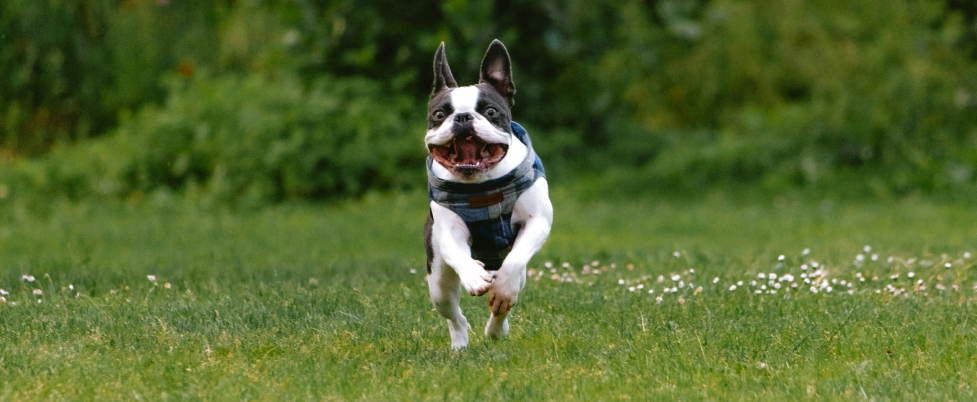TRAINING & BEHAVIOR / FUN & GAMES

Disclaimer: I am not a veterinarian. Always consult your vet about your Boston Terrier’s specific energy and playtime needs.
Introduction
Boston Terriers are a lively yet adaptable breed, making them wonderful companions for various lifestyles. Playtime is essential for their physical health, mental stimulation, and strengthening your bond. By understanding their unique energy levels, you can create a balanced routine that keeps your Boston Terrier happy, healthy, and thriving.
1. Understanding Boston Terrier Energy Levels
Breed Traits and Activity Needs
- Bostons are known as the “American Gentleman” with a playful and lively temperament.
- Typically require 30–60 minutes of exercise daily.
Individual Variations
- Factors that affect energy levels:
- Age: Puppies are more energetic; seniors need gentle activity.
- Health: Medical conditions like brachycephalic issues can limit activity.
- Temperament: Boston Terriers are generally athletic and energetic although some can be naturally more laid-back.
2. Why Playtime Is Crucial
Physical Health Benefits
- Prevents obesity and supports a healthy weight.
- Strengthens muscles and joints.
Mental Health Benefits
- Reduces boredom and destructive behaviors.
- Provides an outlet for natural instincts, like chasing and fetching.
Social Benefits
- Improves socialization with other dogs and people.
- Helps them learn boundaries and good behavior during play.
3. Ideal Playtime Routines for Boston Terriers
Daily Playtime Recommendations
- Puppies: 5 minutes of play per month of age per session, multiple times daily.
- Adults: 30–60 minutes daily, split between walks and play.
- Seniors: 20–30 minutes of low-impact play or light walking daily.
Play Sessions
Incorporate both physical and mental activities:
- Fetch and tug-of-war for energy release.
- Puzzle toys and hide-and-seek for mental stimulation.
4. Indoor Play Ideas
Keeping Your Boston Entertained Inside
- Tug-of-War: Simple, engaging, and helps burn energy.
- Puzzle Toys: Keeps their minds sharp and prevents boredom.
- Hide-and-Seek: Hide treats or toys for them to find.
Short Bursts of Energy
- Use stairs or hallways for short sprints.
- Set up a mini obstacle course with household items, like hula hoops, blankets, baskets and pillows.
AKC – Agility training for dogs
5. Outdoor Play and Exercise
Fun Outdoor Activities
- Fetch in the Yard: A classic game to tire out your Boston.
- Dog Park Visits: Let them socialize and play off-leash in a safe environment.
- Short Hikes: Stick to flat, shaded trails to avoid overexertion.
Seasonal Considerations
- Summer: Exercise in the early morning or late evening to avoid overheating.
- Winter: Consider a dog sweater to keep them warm during outdoor play and dog boots if there is snow on the ground.
6. Signs of Overexertion or Under-Stimulation
Overexertion
- Excessive panting or labored breathing.
- Limping or reluctance to continue playing.
Under-Stimulation
- Destructive behaviors like chewing or excessive barking.
- Restlessness or hyperactivity indoors.
7. Tools and Toys for Playtime Success
Must-Have Items
- Interactive Toys: Puzzle feeders, treat-dispensing balls.
- Safe Chew Toys: Avoid items that can splinter or break.
- Harness: Essential for safe walks and reducing neck strain.
Where to Find Them
Kong toys
Chewy – Kong Toys
Step in dog harnesses
Interactive Toys
Additional reading
8. Playtime Safety Tips
Supervision Is Key
- Always supervise play with new toys or around other dogs.
- Monitor for signs of fatigue or overheating.
Know When to Stop
- If your Boston starts panting heavily, take a break.
- Provide water and a cool, shaded area for rest.
9. Customizing Playtime for Your Boston
Puppies
- Stick to short, high-energy games.
- Avoid activities that strain developing joints.
Adults
- Incorporate a mix of aerobic and mental activities.
- Adjust play intensity based on their behavior and needs.
Seniors
- Focus on gentle, low-impact activities.
- Prioritize mental stimulation to keep their minds sharp.
Conclusion:
Balancing physical activity and mental stimulation is key to your Boston Terrier’s well-being. Tailor playtime to suit their energy level and life stage, ensuring it’s safe, engaging, and enjoyable. Regular, thoughtful activities will keep your Boston happy and healthy.
Pro Tip: Focus on quality over quantity! Customized, meaningful playtime is the secret to a thriving and content Boston Terrier.

Other articles by this author

“Hi! I’m Weezie, a spirited Boston Terrier / French Bulldog mix and self-proclaimed expert on everything Boston.
- Article 1
- Article 2
- Article 3